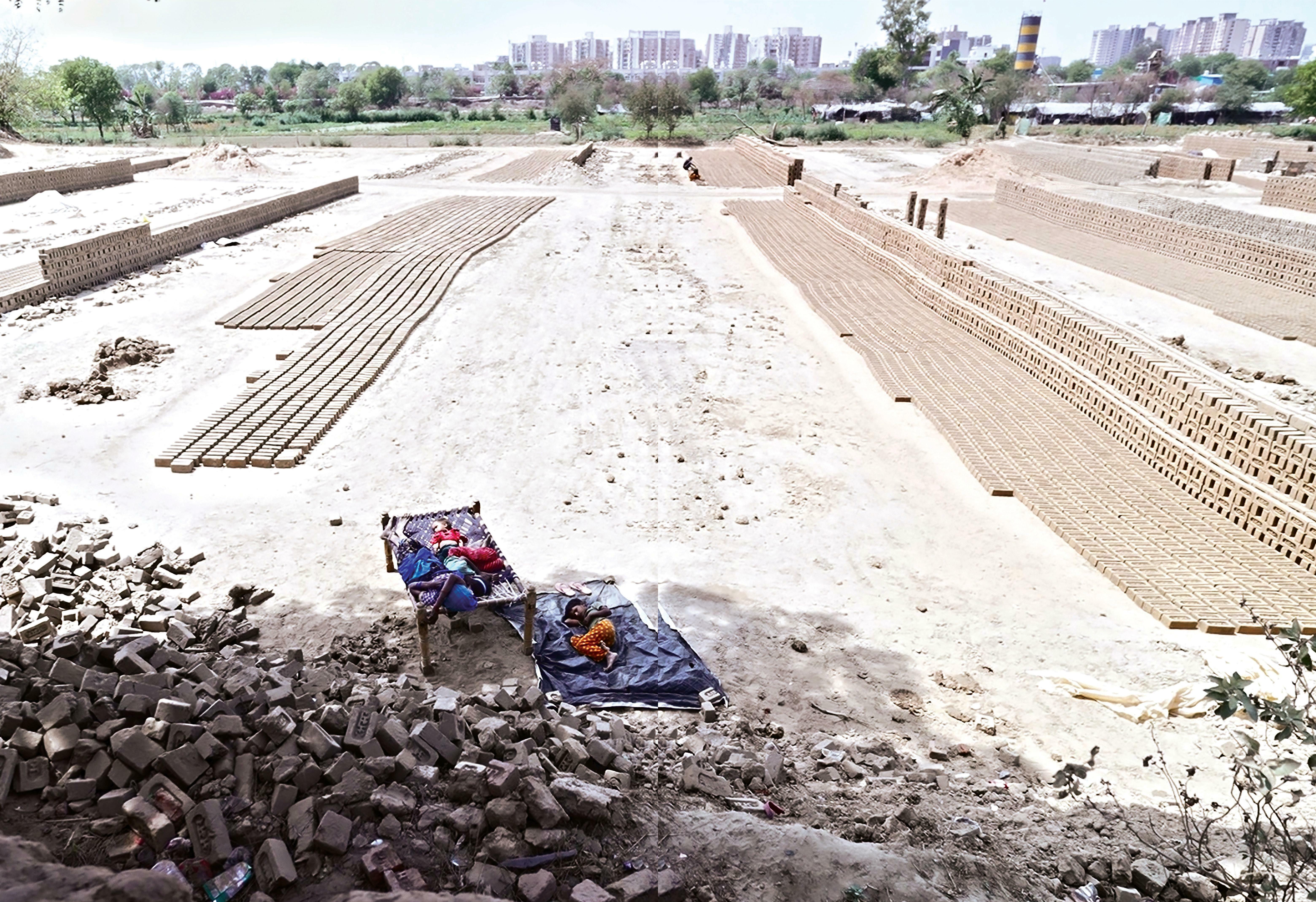Prøve GULL - Gratis
BLAZING SUN IS ON
Down To Earth
|May 01, 2024
Rising temperatures are testing the limits of human tolerance to heat. With their predominantly built-up landscape, urban areas offer no respite. A study by the Centre for Science and Environment on the morphology and heat patterns of nine Indian cities over the past decade shows how these urban centres are turning into heat islands with a potentially serious impact on human health. An analysis by Rajneesh Sareen, Mitashi Singh and Nimish Gupta, with Shagun in Haryana and Kiran Pandey

BIRESH KUMAR, a 38-year-old labourer, works at least six hours in the sun every day. Though it is only mid-April-early days of summer in north India-the afternoon temperatures hover around 38°C in Bhopani, the village in Haryana's Faridabad district where Kumar works at a brick kiln. When the summer peaks in May-June, the mercury will likely cross 40°C. "I feel like I'm trapped in a heat island. But I have to work to repay a debt I owe to the labour contractor," says Kumar.
Sitting on a cot under a tree at some distance is Kumar's co-worker Somveer. For the past two days, Somveer has had body ache, weakness and fever, which have forced him to miss work and, as a result, forego his wage. He does not know the reason for his condition, but says it could be due to constantly working under the sun. The National Institute for Occupational Safety and Health, US, recommends that those who work in the heat should consume 237 ml of water every 15-20 minutes. But for workers like Kumar and Somveer, that would mean more breaks and missed targets, resulting in a loss of wage. Neeraj Kaushik, medical officer in-charge at the government hospital in Kheri Kalan that Somveer and Biresh have access to, says he sees several labourers with complaints of fainting episodes. "They are weak and dehydrated, with severely chapped lips. If they have comorbidities, like diabetes, it becomes an emergency situation. If their vitals are weak, it takes a long time to resuscitate them," he says.

Denne historien er fra May 01, 2024-utgaven av Down To Earth.
Abonner på Magzter GOLD for å få tilgang til tusenvis av kuraterte premiumhistorier og over 9000 magasiner og aviser.
Allerede abonnent? Logg på
FLERE HISTORIER FRA Down To Earth

Down To Earth
JINALI MODY - ENTREPRENEUR
In September 2025, UN Environment Programme announced Mumbai-based Jinali Mody, founder of material-science startup Banofi Leather, as a Young Champion of the Earth.
2 mins
January 01, 2026

Down To Earth
IT'S AN ENDLESS BATTLE
A decade spent tackling waste still feels vanishingly small
2 mins
January 01, 2026

Down To Earth
'NUMB, AND UNABLE TO ACT
As disasters grow more frequent, I find myself wondering how long I can continue living here, waiting for the next storm
2 mins
January 01, 2026

Down To Earth
SAJANA SAJEEVAN - CRICKETER
In April 2024, Sajana Sajeevan got her maiden call up to the national women's cricket team on the back of a 12-year domestic career that began in the paddy fields of Wayanad, Kerala.
4 mins
January 01, 2026

Down To Earth
NILA MADHAB PANDA - FILMMAKER
Few storytellers bring dramatic despair of ecological loss to the big screen like Nila Madhab Panda. The national-award winning filmmaker often makes nature his central character, be it in his 2017 film Kadvi Hawa or in the 2023 web series The Jengaburu Curse.
4 mins
January 01, 2026

Down To Earth
CHETAN SINGH SOLANKI: SCIENTIST | SOCIAL ENTREPRENEUR
For the past five years, Chetan Singh Solanki has been on a singular journey.
2 mins
January 01, 2026

Down To Earth
ʻLIVING SLOWLY, RELUCTANTLY
The pleasures and burdens of attempting a sustainable life in a fast-moving world
2 mins
January 01, 2026

Down To Earth
KIRAN RAO
Filmmaker and producer Kiran Rao has mastered the art of mainstreaming social commentary, as seen in her early films like Dhobi Ghat and more recently in Laapataa Ladies and Humans in the Loop.
4 mins
January 01, 2026

Down To Earth
I SEE THE RISE OF DEFENDERS
When a species disappears from a land, the loss extends far beyond the species itself.
2 mins
January 01, 2026

Down To Earth
MANISH MEHROTRA - CHEF | RESTAURATEUR
Manish Mehrotra is globally recognised for his innovative approach to preserving India's culinary heritage.
4 mins
January 01, 2026
Listen
Translate
Change font size
